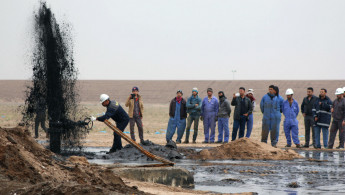Arab budgets in 2015: Deficits and crises
Falling oil prices and continued regional conflict and instability has translated into significant deficits in the 2015 budgets of most Arab countries.
The budget deficits not only affect these countries' monetary policies, but also extend to public investment.
The shortfalls directly affect eight Arab oil-producing countries hit hard by falling prices, which now sit at $55 a barrel. A year ago, oil was frequently over the $100 mark.
Countries including Egypt, Morocco and Tunisia have reduced the subsidies allocated for fuel and food because of deficits.
Algeria: The biggest deficit
| Algeria would need oil to be priced at $110 a barrel to achieve a budget surplus. |
Algeria tops the list this year, with a reported deficit of $52 billion, after parliament approved a budget with estimates of $57.8 billion in revenue, and expenditure exceeding $109 billion.
According to the International Energy Agency, the country would need oil priced to be at approximately $110 a barrel to achieve a surplus.
However, Mohamed Hamitouche, an Algerian monetary expert formerly at the World Bank, said he believed the projected deficit was not realistic, because of the method in which expected revenue was calculated.
Hamitouche said the budget was based on $37 per barrel of oil, lower than the actual price at the moment, although prices are expected to fall over the next year.
Egypt: Signs of decline
Egypt is on track to reducing its deficit for 2014/2015 to $34 billion, compared with a deficit of $35.7 billion last year, through the reduction of fuel subsidies.
The most populous Arab country is expected to make a saving of approximately $4 billion on fuel due to falling international oil prices, according to Petroleum Minister Sherif Ismail.
Financial analyst Mohamed Riyadh believes the Egyptian deficit could be further reduced as a result of decreasing oil prices and hopes of improved tourism revenues.
However, the government still projects a deficit of approximately $17.3 billion for the first half of the 2014/2015 budget, which accounts for 55 percent of this year's projected deficit.
Iraq: Budget crisis
The Iraqi budget projects a deficit of $21.4 billion, with revenues projected at $80.6 billion and expenditure of $102 billion.
The government, which relies on oil to fund 95 percent of its budget, reportedly used an estimate of $56 a barrel to calculate its budget, based on oil exports of 3.3 million barrels a day, though it currently produces only 2.5 million barrels daily.
While the Iraqi parliament has yet to approve the budget, due to disagreements between the various political blocs, the parliamentary finance committee estimated a deficit of $19.7 billion, the largest deficit in Iraq's modern history.
Tunisia: Increased deficit
The Tunisian economy was not immune to problems facing other Arab budgets.
However, conflicting projections have the Tunisian deficit increasing by five percent to $4 billion for 2015, based on estimated revenues of $15.69 billion or, according to Reuters, shrinking from 5.8 percent to five percent of GDP.
The World Bank recently released a report in which it warned of the dangers Tunisia would face if it did not take basic steps to reduce fuel subsidies and control the budget.
Non-conformist Morocco
Despite most Arab countries basing their budgets on a $55/barrel average price of oil, Morocco, an oil importer, has calculated its budget on oil prices of $103 per barrel.
According to the office charged with monitoring exchange rates in the country, the continued fall in oil prices will reduce the funds allocated for importing oil by 50 percent.
Based on the Moroccan forecast for oil prices, this year's expenditure is estimated to reach $42.5 billion, with revenues estimated at $38.5 billion - a projected deficit of $4 billion.
Yemen: Conflicts stall the budget
The Yemeni government has not been able to draft its 2015 budget due to the ongoing conflict with the Houthis.
The government has instead extended the 2014 budget, which projected a $3.2 billion deficit with $13.4 billion projected spending and $10.2 projected revenues.
Masoud Ahmed, the Middle East director at the International Monetary Fund, has stated Yemen needs to take serious measures to encourage investment.
Sudanese mystery
| The Sudanese finance minister Badr al-Din Mahmoud announced that his country expects a surplus of $271 million. |
In a surprising twist that has defied all forecasts, Sudan's Finance Minister Badr al-Din Mahmoud announced that his country expects a surplus of $271 million, according to the official exchange rate in 2015.
He also confirmed Sudan achieved a surplus in the 2014 budget, however he did not specify the amount. Forecasts had estimated a deficit of $2.11 billion for the coming year.
Syria: A war budget
The Syrian budget has not been announced in detail, and the government simply released general indicators that show an estimated spending of $9.1 billion and revenues of $5.5 billion, with an estimated deficit of $3.6 billion.
Syria has lost important sources of revenue, such as oil, tourism and manufacturing, due to the ongoing conflict.
This is an edited translation from our Arabic edition.



